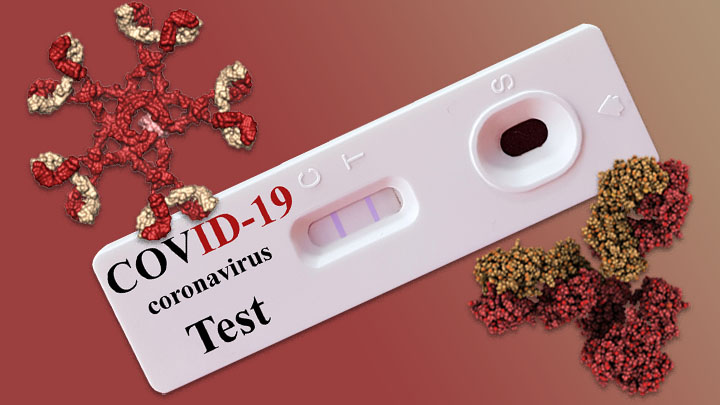Almost everyone who recovers from Covid-19 makes coronavirus antibodies, study shows

Credit: National Institute of Health
By Dr. Francis Collins
There’s been a lot of excitement about the potential of antibody-based blood tests, also known as serology tests, to help contain the coronavirus disease 2019 (COVID-19) pandemic. There’s also an awareness that more research is needed to determine when—or even if—people infected with SARS-CoV-2, the novel coronavirus that causes COVID-19, produce antibodies that may protect them from re-infection.
A recent study in Nature Medicine brings much-needed clarity, along with renewed enthusiasm, to efforts to develop and implement widescale antibody testing for SARS-CoV-2 [1]. Antibodies are blood proteins produced by the immune system to fight foreign invaders like viruses, and may help to ward off future attacks by those same invaders.
In their study of blood drawn from 285 people hospitalized with severe COVID-19, researchers in China, led by Ai-Long Huang, Chongquin Medical University, found that all had developed SARS-CoV-2 specific antibodies within two to three weeks of their first symptoms. Although more follow-up work is needed to determine just how protective these antibodies are and for how long, these findings suggest that the immune systems of people who survive COVID-19 have been be primed to recognize SARS-CoV-2 and possibly thwart a second infection.
Specifically, the researchers determined that nearly all of the 285 patients studied produced a type of antibody called IgM, which is the first antibody that the body makes when fighting an infection. Though only about 40 percent produced IgM in the first week after onset of COVID-19, that number increased steadily to almost 95 percent two weeks later. Some of these patients also produced a type of antibody called IgG. While IgG often appears a little later after acute infection, it has the potential to confer sustained immunity.
To confirm their results, the researchers turned to another group of 69 people diagnosed with COVID-19. The researchers collected blood samples from each person upon admission to the hospital and every three days thereafter until discharge. The team found that, with the exception of one woman and her daughter, the patients produced specific antibodies against SARS-CoV-2 within 20 days of their first symptoms of COVID-19.
Meanwhile, innovative efforts are being made on the federal level to advance COVID-19 testing. The NIH just launched the Rapid Acceleration of Diagnostics (RADx) Initiative to support a variety of research activities aimed at improving detection of the virus. As I recently highlighted on this blog, one key component of RADx is a “shark tank”-like competition to encourage science and engineering’s most inventive minds to develop rapid, easy-to-use technologies to test for the presence of SARS-CoV-2.
On the serology testing side, the NIH’s National Cancer Institute has been checking out kits that are designed to detect antibodies to SARS-CoV-2 and have found mixed results. In response, the Food and Drug Administration just issued its updated policy on antibody tests for COVID-19. This guidance sets forth precise standards for laboratories and commercial manufacturers that will help to speed the availability of high-quality antibody tests, which in turn will expand the capacity for rapid and widespread testing in the United States.
Finally, it’s important to keep in mind that there are two different types of SARS-CoV-2 tests. Those that test for the presence of viral nucleic acid or protein are used to identify people who are acutely infected and should be immediately quarantined. Tests for IgM and/or IgG antibodies to the virus, if well-validated, indicate a person has previously been infected with COVID-19 and is now potentially immune. Two very different types of tests—two very different meanings.
There’s still a way to go with both virus and antibody testing for COVID-19. But as this study and others begin to piece together the complex puzzle of antibody-mediated immunity, it will be possible to learn more about the human body’s response to SARS-CoV-2 and home in on our goal of achieving safe, effective, and sustained protection against this devastating disease.
Reference:
[1] Antibody responses to SARS-CoV-2 in patients with COVID-19. Long QX, Huang AI, et al. Nat Med. 2020 Apr 29. [Epub ahead of print]
Links:
Coronaviruses (National Institute of Allergy and Infectious Diseases/NIH)
“NIH Begins Study to Quantify Undetected Cases of Coronavirus Infection,” NIH News Release, April 10, 2020.
“NIH mobilizes national innovation initiative for COVID-19 diagnostics,” NIH News Release, April 29, 2020.
Policy for Coronavirus Disease-2019 Tests During the Public Health Emergency (Revised), May 2020 (Food and Drug Administration)
________________________
Credit: NIH Director’s Blog (National Institutes of Health U.S.)

















